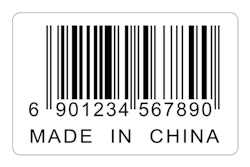Look before you leap: Here are some tips, especially with regard to the supply chain, to follow before you set up shop in China.
The wave of companies expanding into China today is discovering that transferring business operations to the region is fraught with complexities. But the potential rewards are as huge as the massive country itself. China is the fastest-growing market on the globe. It will soon be the world's manufacturing powerhouse, and that fact alone dictates that producers, their suppliers and service-oriented corporations create a presence in the country.
For suppliers whose customers are speeding to China, this strategy makes sense not only to enable them to take advantage of the economics of producing there, but also to serve the eager domestic Chinese market that is exploding in demand.
Before taking the giant leap to move operations into China, there are a few things that should be understood and considered.
Suppliers should interview current customers about their needs for their China operations. Automotive manufacturers setting up shop in China want to have their major suppliers close to their assembly operations. Just-in-time (JIT) manufacturing techniques are one reason. Another reason is to avoid unnecessary taxation: China requires all products to have at least 40 percent local content if they are to be sold in that country. Rapidly increasing numbers of suppliers are opening shop there to meet these local-content requirements and avert the additional fees imposed on imported or other high-foreign-content goods. Moreover, those that don't supply local content quickly lose business to competitors that do.
While market opportunities and client demands can make a move to China essential, it's not necessarily an easy step to take. Businesses must become highly informed regarding the Chinese culture and Chinese ways of doing business. Companies must work through legal and cultural challenges and comprehend the true size of the market there. Chinese law governs all business transacted in China, and these laws are less defined than those of the United States.
Compounding the complexity, China itself envelops many different cultures. North China is considerably different from the south. The need to understand local customs, work ethics and business practices may require partnering with companies already there, firms that are familiar with the special requirements for working in this very complex cultural tapestry.
Different Countries, Different Supply Chain Practices
The partners you choose must understand both the American and Chinese ways of doing business and be of sufficient size to serve all your client companies in China. They should have experience in supply chain management in developing countries and also have the technical capabilities to translate and localize products for China. By hiring well-established partners, you may find you immediately can provide in-China client references and gain additional revenue streams.
China does not have the extensive supply chain infrastructure prevalent in traditional manufacturing countries. Local supplier operations primarily are carried out on paper and with their most abundant resource: people power. Computerized systems are very new to them and may be very expensive.
In fact, capitalism itself is still a relatively new concept for Chinese manufacturers. Processes and products must consistently be adapted to the Chinese language for implementation and training. Businesses must translate and localize products for easy use by Chinese nationals in their local market and plan for ways to mesh the company's products and services with the Chinese business system. Western transplants must always be aware of the need to abide by the local way of operating a business and the government-imposed taxes that must be included on invoices, as well.
Additionally, Chinese companies want to see a return on major investments, not in 10 years, but in two or three.
Companies considering a move to China should be encouraged but should not move hastily. Extensive planning is crucial. For example, businesses must plan for dealing with sourcing issues, especially long-distance sourcing to manage the global supply chain. They must take their time to understand the Chinese market and do their homework to avoid mistakes. They need to have experience, and they must pick the right partners who have a local view. There's no fast way of doing it without risking a very expensive mistake.
Companies establishing operations in China need a solid strategic business plan that focuses on growth, not just cutting costs. They should establish a high-level senior staff in China on site to manage the company's China operations. They need a full-time C-level staff in China to get things up and running and then to maintain operations and manage growth.
The Culture Gap
The Chinese work ethic is remarkable; they work hard and aggressively, are very quick to learn business techniques and are very friendly and kind. Businesses entering the country, however, should set strict criteria for hiring Chinese employees, taking time to interview all prospective candidates in depth to ensure they meet the criteria.
City infrastructures in China are new and sometimes have difficulty keeping up with the demands of business. In Shanghai, for instance, the government contacts the manufacturing plant and informs the company of the hours of the day it will receive electricity. Officials may say, You have to work from 10 p.m. to 6 a.m. You have power during those hours, and it's cut off to you the remainder of the time, while another plant is working from 6 a.m. to 2 p.m. What America built in 200 years, the Chinese are trying to build in 10, and it often strains their resources.
The transportation infrastructure in China also is new. For example, some companies use buses to pick up employees at their homes at the start of the work day and return them home at the end of their shifts. Outside the major cities, people still transport goods by bicycle; the use of trucks is limited.
With proper planning, solid partnerships, flexible business systems and products, and an ability to adapt to the country's cultural demands, businesses will discover enormous opportunities in China; and China will benefit enormously from the enterprises that establish their operations in the world's largest and most eager market.
About the Author: As Vice President, Global Business Development for the Discrete Solutions Group of Infor Global Solutions, formerly Agilisys, Wolfgang Greil leads automotive sales worldwide with a focus on the organization's Asian strategy, global supply chain strategy and new product offerings.












